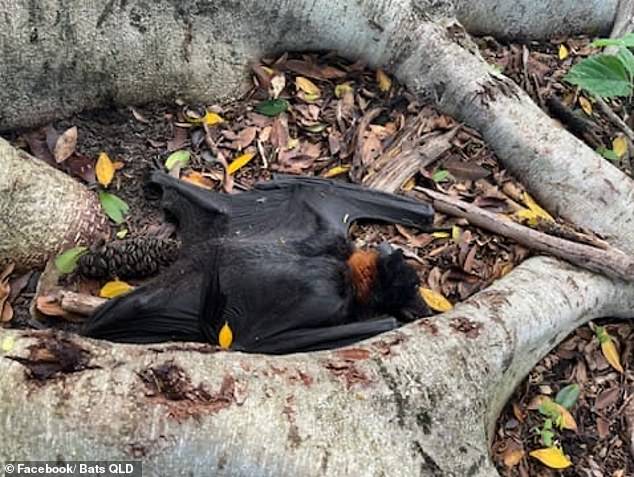Australian wildlife ‘crisis’ as hundreds of birds and flying foxes ‘fall from the sky’ over Christmas
Hundreds of flying foxes and rainbow birds have fallen from the sky and are suffering from a mysterious illness.
The animals were discovered paralyzed or dead in a large area of south-east Queensland and northern NSW over the past month.
Experts call the phenomenon Lorikeet Paralysis Syndrome (LPS) and Flying Fox Paralysis Syndrome (FFPS), but little is known about its cause.
Scientists have found that the phenomenon is more common in summer and believe an environmental toxin could be responsible, as both species share the same pollen and fruit diet.
Groups involved in monitoring the two populations say this is the worst they have seen in ‘five years’ and is spreading rapidly.
Gold Coast rehabilitation service Bats QLD described the recent spike as a “natural crisis” and said it was taking a toll on volunteers’ mental health.
“Something is terribly wrong and we are doing everything we can to help the animals we can help,” the agency wrote in a post on Facebook.
“For the others, the best we can do is ensure a quick, painless death to put them out of their misery.”
Environmental advocates have raised the alarm about a potential ‘wildlife crisis’ after hundreds of rainbow parakeets and flying foxes were found dead with a mystery disease (stock image)
Birds with the disease show signs of paralysis, changes in their voice and have difficulty standing, blinking or swallowing.
Bats also become paralyzed by the disease and can have protruding tongues and difficulty swallowing and breathing.
Volunteers for Bats QLD reported finding flying foxes paralyzed in the water for so long that their ‘skin was literally peeling off’ and infested with maggots while they were still alive.
‘Can you imagine the pain, the fear? It is literally a living nightmare,” the post reads.
The group has called for more resources from government agencies to investigate what is causing the seasonal deaths.
“We are tired of constantly calling government agencies asking for help to figure out what is causing this,” they wrote.
“This problem is not going away, it is escalating and we are becoming more desperate by the hour.”
Research from the University of Sydney has found that no ‘infectious agent or man-made toxin’ is the cause of LPS.

The animals were found dead or on the brink of death (pictured), as they were paralyzed by the disease with no known cause of the disease at this time.
Although no direct cause can be found, the research suggests that the loris-based disease could be due to ‘ingestion of a poisonous plant’ in the area.
“The seasonality of the disease indicates a flowering/fruiting period of the poisonous plant that occurs from October to June,” according to the university’s website.
‘The distribution of locations where parakeets occur is not random, suggesting that if a poisonous plant is the cause of LPS, the plant will be present in some areas but not in others.’
Bats QLD president Rhiannon Traish-Walker said the disease is not a death sentence and volunteers rely on citizens to report any incident to increase their chances of survival.
“It is crucial to encourage people to call a rescuer as soon as they see a bat alone or close to the ground during the day,” Ms Traish-Walker said. Yahoo.
“The sooner we can reach them, the better their chances of survival.”
